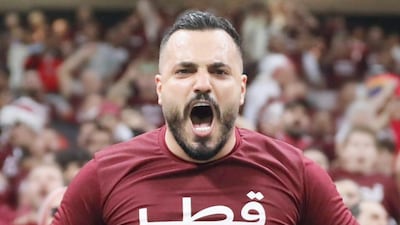From his smartphone, Hussein Hammoud played a video showing a stadium full of hundreds of enthusiastic football supporters wearing the maroon Qatar jersey, jumping up and down while chanting in unison.
The supporters are rigorously following the instructions of their coach, who is energetically waving his arms to channel the crowd's excitement, like a conductor would lead an orchestra.
The scene, which took place in the host country a couple of weeks before the World Cup, was one of the many rehearsals of the Qatari national team's Arab Fans' League.
Qatar's initiative aimed to gather and train football fans from around the Middle East and North Africa to support their national team.
Mr Hammoud, 29, a Lebanese football supporter, was proud to be one of the Arab Fans' League’s coaches.
“The Fans' League was a very bonding experience between Arabs and I was really proud to be part of it. It was all the more meaningful because it is the first World cup taking place in an Arab country”, he said, sat in a cafe in Beirut, the capital of Lebanon, where he returned to a couple of days ago.
He said the league gathered Arabs from Qatar, Lebanon, Algeria, Syria, Egypt, Palestine, Jordan and Syria.
“I had never met so many people from so many different Arab countries,” he said. “We could not even understand each other at the beginning because our dialects are different. But these weeks of training created a sentiment of unity."
This was far from being his first time leading a crowd of football supporters.
Mr Hammoud is a well-known figure on the Lebanese football scene. He is a fan leader for Lebanon’s national football team and for the Nejmeh Sporting Club, whose crest he has tattooed on his chest.
Also a Brazil supporter, like many Lebanese, Mr Hammoud does not normally follow the Qatar team, who have never qualified for the competition before hosting. But this World Cup, marked by Morocco's historic performance, has ignited pan-Arab unity.
“It was natural for me to cheer for Qatar, the same way I cheered for Morocco. As an Arab, I support Arab teams over any other," he said.
Casting and training football fans
A couple of months before the competition, Qatar organised castings across the region to choose the best football fans. “After the casting in Beirut, they selected around 150 Lebanese from all ages and sects”, out of a total of approximately 2,000 Arab fans in the league, he said.
Mr Hammoud landed in Qatar a couple of months before the World Cup, while other Lebanese fans came in the following weeks, but “most of the foreigners were Arab expats already living in Qatar, so they were already on-site”, he said.
The league rehearsed once or twice a week in different stadiums across the country. The most experienced were appointed as coaches to conduct the crowd and put on the best performance for the Qatari team.
The Arab world has a culture of passionate football fans, with countries such as Egypt being well known for their extreme supporters — the ultras — who have assumed important political roles in the country.
“It was a co-operation from all Arab countries to exchange our respective football experiences,” Mr Hammoud said.
The fans used chants specially created for the World Cup. “Some were inspired by traditional Qatari songs. We also had songs based on generic football tunes tailored to the Qatari accent — which I ended up speaking perfectly,” he said.
Some media reported that the recruited fans were offered a full package including tickets and hotels in exchange for their support.
For Mr Hammoud, it was first and foremost a chance given to Arabs to attend a historic event, he said.
The Arab Fans’ League performed their carefully choreographed support for only three matches as Qatar were quickly knocked out of the competition, losing to Ecuador, Senegal and the Netherlands and becoming the first host nation to lose all its group stage matches.
“It does not matter that we lost, the ambience was incredible, I am really proud of what we achieved, and I would do it all over again," Mr Hammoud said.
























